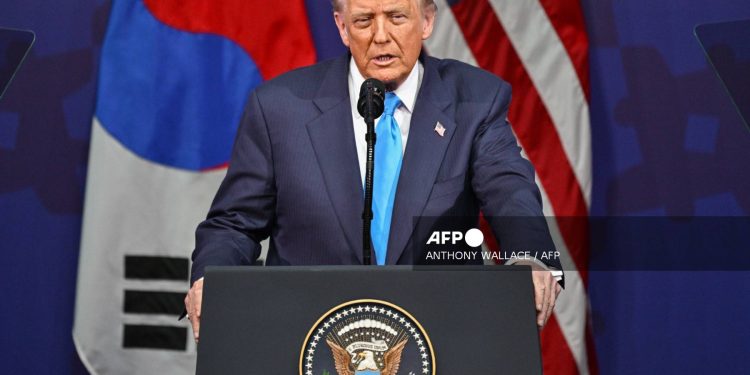Nigeria’s financial markets opened November 2025 on a weak note as both the naira and equities declined sharply, following remarks by U.S. President Donald Trump threatening possible military intervention in Nigeria over alleged religious persecution.
Data from the Central Bank of Nigeria (CBN) showed that the naira, which had traded at a 2025 peak of ₦1,421.73/$, depreciated to ₦1,436.34/$ on Monday — a 1.03 per cent loss (₦14.61) in a single day. At the parallel market, the local currency also weakened to ₦1,455/$, reflecting heightened investor anxiety and increased demand for foreign exchange.
The downturn came after Trump, in a post on Truth Social, labelled Nigeria a “country of particular concern” and directed the U.S. Department of War to prepare for “possible action” if the alleged killings of Christians persisted.
Trump described the situation as a “Christian genocide”, sparking widespread global debate and fears of diplomatic and economic fallout for Africa’s largest economy.
The shockwave spread quickly through the capital market. At the Nigerian Exchange Limited (NGX), the All-Share Index fell by 0.25 per cent to close at 153,739.11 points, cutting year-to-date gains to 49.37 per cent. Market capitalisation also dipped by ₦245.88 billion, settling at ₦97.58 trillion.
The bearish mood was driven by selloffs in Aradel Holdings (-9.21%) and Access Corporation (-3.07%), as investor sentiment weakened — with 38 decliners against 19 gainers. Union Dicon led the gainers (+9.93%), while Honeywell Flour Mills topped the losers (-10.00%).
Trading activity slumped, with total volume and value traded plunging by 87.94 per cent and 44.64 per cent, respectively, to 627.5 million units worth ₦25 billion. UBA dominated the day’s trade, accounting for 136.8 million units (21.8%) valued at ₦5.5 billion (22.2%).
Sectoral performance was mixed. Oil & Gas (-3.94%), Commodities (-1.85%), Insurance (-1.48%), and Banking (-0.22%) indices all closed lower, while Consumer Goods gained 0.49 per cent. The Industrial sector closed flat.
Bonds and External Markets
In the bond market, Cowry Assets Management reported that investor appetite for Nigeria’s Eurobonds weakened, with average yields rising by five basis points to 7.70 per cent. The firm attributed the sell-off to global risk aversion, macroeconomic uncertainty, and geopolitical tensions.
According to Bloomberg, Nigeria’s dollar-denominated bonds were the worst-performing among emerging markets on Monday, with all ten notes ranking among global underperformers. Bonds maturing in 2047 dropped the most — down 0.6 cents on the dollar to 88.26 cents, before trimming losses later in the day.
Despite the initial panic, some analysts described the reaction as temporary.
Tilewa Adebajo, CEO of CFG Advisory, told The PUNCH that the dip was “not sustainable.”
“This appears to be a mere blip. Closing prices in global markets today already reflect recovery. With Nigeria recently removed from the FATF Grey List, the market still offers strong long-term fundamentals,” Adebajo said.
However, Dr. Musa Yusuf, CEO of the Centre for the Promotion of Private Enterprise (CPPE), warned that Trump’s remarks could damage investor confidence.
“The U.S. President’s threat of military intervention in Nigeria is unwarranted, counterproductive, and economically destabilising. Such remarks send unsettling signals to investors, heighten risk perception, and undermine confidence in Nigeria’s economy,” he said.
Yusuf added that Nigeria must strengthen internal security and governance while pursuing cooperative, not coercive, diplomacy.
“Unilateral military action would destabilise Nigeria’s economy, threaten regional stability, and worsen humanitarian conditions. The constructive path forward lies in diplomacy, partnership, and mutual respect for sovereignty.”
As markets await clearer signals from both Washington and Abuja, analysts agree that stability and investor confidence will depend on calm diplomacy, consistent policy direction from the Federal Government, and decisive actions by the CBN to sustain market liquidity and reassure investors.















